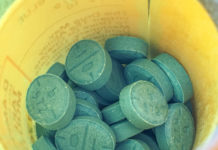ADHD Stimulant Use Again Strongly Linked to School Accountability
Wealthier children are more likely to take stimulants only during the school year and not during the summer, according to a study in American...
Stimulant Medication Use Linked to Sharp Increase in BMI by Eighth Grade
New evidence suggests that children on ADHD medication may have stunted growth initially but more rapid increases in body mass over time.
Children Diagnosed with ADHD Younger are More Likely to get Multiple Medications
New research demonstrates that children diagnosed with ADHD at younger ages are more likely than those diagnosed later to receive multiple medications within five years of their diagnosis.
Ritalin Impairs Learning and Memory
Ritalin reduced impulsive responses and increased the amount of time willing to stay on task of Rhesus monkeys in a study from the University...
Taking “Holidays” from ADHD Drugs Helps Prevent Growth Retardation in Children
It's common for children and adolescents to take prolonged "drug holidays" from their ADHD medications during summer months away from school, and there appear...
ADHD Medication Slows Growth, Increases Obesity
Treating attention deficit/hyperactivity disorder (ADHD) with stimulants affects growth and is likely to cause a higher BMI in later adolescence, according to research from...
More Time in Foster Care Linked to More Psychotropic Medicating
Children as young as four in foster care are taking three or more psychotropic medications, and the length of time that children aged six...
Risk of Depression Spikes When Kids Take Ritalin
Risk of depression increased when children were taking methylphenidate for ADHD, but once they stopped taking the drug, depression risk dropped to normal levels.
Ritalin Causes Long-Lasting Change in Prefrontal Neurons
Drexel University researchers found that methylphenidate (Ritalin) administered to juvenile rats produced significant depressive effects on pyramidal neurons. The authors conclude that "the juvenile...
Stimulants Don’t Improve Academic Performance in Kids with ADHD
“Efforts to improve learning in children with ADHD should focus on obtaining effective academic instruction rather than stimulant medication.”
Ritalin Increases Risk-Taking in Women
Women who were asked to play a gambling were significantly more likely to keep betting when the stakes increased if they had taken Ritalin...
Better Sleep Helps With ADHD; Medications Worsen Sleep
"Sleep-focused treatment improves mood and quality of life in children with attention-deficit/hyperactivity disorder," reports Psychiatric News, covering a presention by Dalhousie University researcher Penny...
Despite the Evidence, Overprescription of Stimulants Continues
A new study finds that stimulant prescribing rates to children continue to rise despite the well-established evidence documenting overdiagnosis of ADHD and overprescription of stimulants.
ADHD Drugs Linked to Cardiovascular Disease
Service users taking drugs to treat ADHD may be at increased risk for hypertension and arterial disease
Children Taking ADHD Drugs More Likely to Take Antidepressants as Teens
Adhering to a commonly prescribed medication for ADHD in children is associated with higher chances of being prescribed antidepressants in adolescence.
JAMA Review Questions Use of Ritalin for ‘ADHD’
In December, MIA reported on a systematic Cochrane review on the research for the safety and effectiveness of Ritalin (methylphenidate) that found substantial bias...
Poor Evidence and Substantial Bias in Ritalin Studies
The authors of a large scale well-conducted systematic review of methylphenidate, also known as Ritalin, conclude that there is a lack of quality evidence for the drug’s effectiveness. Their research also revealed that Ritalin can cause sleep problems and decreased appetite in children.
Study Confirms Overdiagnosis of ADHD in Children and Teens
Medical researchers present evidence that ADHD is overdiagnosed in children and teens, which can lead to significant harm.
Many Teens Start Misusing Stimulants By Age 13
An equal percentage of young people will start misusing ADHD-related and other stimulant drugs for the first time at age 13 as will start at age 20.
The Faulty Reasoning That Turned ADHD Into a Disease
Leading ADHD researchers outline four mistakes that turned ADHD from a description of behavior into a medical disease.
ADHD Drugs Linked to Prolonged, Painful Erections
FDA regulators have updated the warning labels on methylphenidate products such as Ritalin, Focalin and Concerta to reflect reports of prolonged, painful erections (priapism)...
Withdrawal from ADHD Medications
This guide to the scientific literature on withdrawal from ADHD drugs provides a review of animal studies, withdrawal syndromes,
and possible tapering protocols.
Psychostimulants Harm Performance, as Well as Neuroplasticity
A review of "potential neurobiological ramifications of the popular cognitive enhancers," in Frontiers of Systems Neuroscience, finds that stimulants reduce performance at higher dosages, and...
Parents’ Goals Affect Choice of Medication vs. Behavior Therapy
Researchers find that parents who are focused on their child's academic achievement are twice as likely to start the child on ADHD medications as...
Stimulant Prescribing Patterns for ADHD Not Impacted by Scientific Evidence
The article suggests that research challenging the evidence for ADHD drugs does not lead to changes without public campaigns.




















